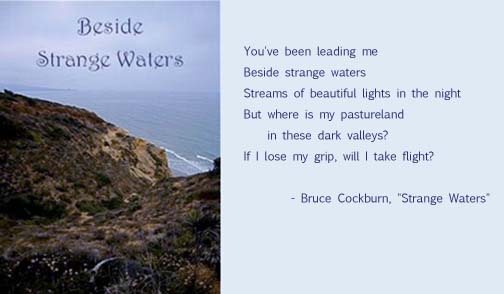(This is long; sorry!)
There is one last reason why I feel Isaiah 14:12-15 does not refer to the fall of Lucifer, and that is the appearance of the coordinating conjunction but in vs. 13.
Consider this narrative describing the fall and subsequent career of Lucifer. First, he becomes proud and says all this stuff about how he's going to be just like God. Then God kicks him out of heaven; all of human history takes place, from creation and the fall of Adam to the visible return of Christ. The story ends with a final judgment in which Satan and all the bad guys are relegated to eternal punishment in the lake of fire. It's a neatly organized sequence, into which Isaiah 14 is inserted as a depiction of Lucifer's catastrophic fall from perfection and heavenly favor.
One problem: Isaiah 14:12-15 does NOT describe a pride-followed-by-fall sequence. Look at the verses again.
“How you have fallen from heaven,
O star of the morning, son of the dawn!
You have been cut down to the earth,
You who have weakened the nations!
“But you said in your heart,
‘I will ascend to heaven;
I will raise my throne above the stars of God,
And I will sit on the mount of assembly
In the recesses of the north.
‘I will ascend above the heights of the clouds;
I will make myself like the Most High.’
“Nevertheless you will be thrust down to Sheol,
To the recesses of the pit.
First, the "star of the morning" is cut down to earth. You'd expect the next word to a word like because, a subordinate conjunction which indicates causation: "You were cut down to the earth because you said in your heart…"
Consider other similarly constructed sentences, and try replacing because with but. It simply will not work. "I was rear-ended because [or but] the guy behind me was tail-gating and talking on his cell phone" or "I got a C on the test because [or but] I didn't study chapter 8."
Now think about but means in these sentences: "I was badly injured in that car accident, but I decided that I would learn to walk again, no matter what." Or, "I got a C on that test, but I don't care. I'd rather fail than read that stupid textbook." In sentences like these, but suggests an event which is followed by reflection, decision, and/or consequences. It does not imply that one event causes another.
So,
(A) Event 2 happens because Event 1 happens first.Or
(B) Event 1 happens, but then Event 2 happens.Assuming the translation into English is accurate, (B) is the chain of events in Isaiah 14.
- Event 1: the star of the morning is cut down to earth.
- Event 2: " But you said in your heart, 'I will ascend to heaven, I will raise my throne,'" etc. In other words, there's been a set-back, but I'm going to be like God anyway.
Is the star of the morning going to realize those lofty goals? No, because God is going to take this guy down even further, beyond being cut down to earth, all the way to the bottom of the land of the dead.
These verses don't narrate Lucifer's pride and subsequent fall; these verses describe the unreasoning persistence of hubris. Apparently, humans (and possibly angels as well) can be stupid and proud to the bitter end. Unfortunately for us, an earnest belief in the certainty of our own success will not be enough to save us from judgment (or, if you prefer, failure and its consequences).

No comments:
Post a Comment